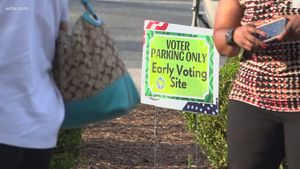Coloradans are bracing for another round of extreme heat as temperatures soar well above normal levels for August. The National Weather Service (NWS) has forecasted 90-degree weather for Denver and the Eastern Plains, with these sizzling conditions expected to linger throughout the weekend.
This heat wave follows several violent thunderstorms earlier this week, which resulted in damaging hail and high winds across various parts of the state. On Monday, residents experienced hail as large as tennis balls, accompanied by tornado touchdowns, prompting emergency responses and efforts to assess the storm impacts.
While many are sweating it out, others are taking preventative measures. At the Blue Angels airshow happening soon, officials have announced extra protocols to safeguard attendees against the intense heat.
Weather records indicate such high temperatures have become alarmingly commonplace not just this summer, but over recent years. The trend reflects broader concerns about climate change as weather patterns shift and extreme occurrences become more frequent.
Accompanying the sweltering heat, the forecast also calls for drier conditions later this week, allowing for some relief after recent storms. Monday's storms brought sudden weather shifts, but forecasters predict clearer skies and less humidity as temperatures climb.
Heat-related incidents are also on the rise, as observed with frequent reports of people fainting due to extreme heat conditions. A recent incident highlighted this reality when a UPS driver fainted due to heat exhaustion, leading to serious concerns about workplace safety amid soaring temperatures.
The driver, having reported symptoms of heat-related illness before fainting, was involved in an accident. This situation has reignited discussions surrounding safety measures for those working outdoors during extreme heat events.
Factories and delivery services are heightening their heat safety protocols, with companies like UPS attempting to implement changes after past incidents. During last summer's negotiations, UPS agreed to introduce air conditioning systems to new delivery trucks, yet older vehicles continue to lack adequate cooling.
Cities are feeling the impact of these temperature increases as local governments urge residents to stay hydrated and take necessary precautions against heat. Residents are being reminded of the risks associated with heat-related illnesses, especially for vulnerable populations like the elderly.
For outdoor activities, experts recommend scheduling operations during cooler hours as much as possible. Parks and public spaces are witnessing community-driven events to beat the heat, providing shade and cooling stations for those enjoying the outdoors.
Despite the extreme conditions, Coloradans remain resilient, finding ways to adapt to this challenging reality. Community support programs are stepping up to provide assistance to those most affected and building awareness about the importance of hydration.
This summer has highlighted the urgent need for awareness and action against the adverse effects of climate change. With each heatwave, communities are learning and adapting, striving to improve safety for workers and residents alike.
Moving forward, expecting the unexpected has become the new normal as Colorado grapples with changing weather patterns. Local meteorologists and climate experts continue to stress the importance of being prepared for extreme weather, emphasizing community-wide cooperation and timely responses.
Residents are encouraged to stay plugged in for continued weather updates as the weekend approaches. The persistence of high temperatures calls for vigilance, with the heat gripping the state, ensuring everyone stays informed and safe.
While Colorado's beauty is radiant, it also poses challenges when the elements become extreme. The upcoming days will serve as yet another test of endurance, but with community solidarity, Coloradans are poised to navigate the heat effectively.



